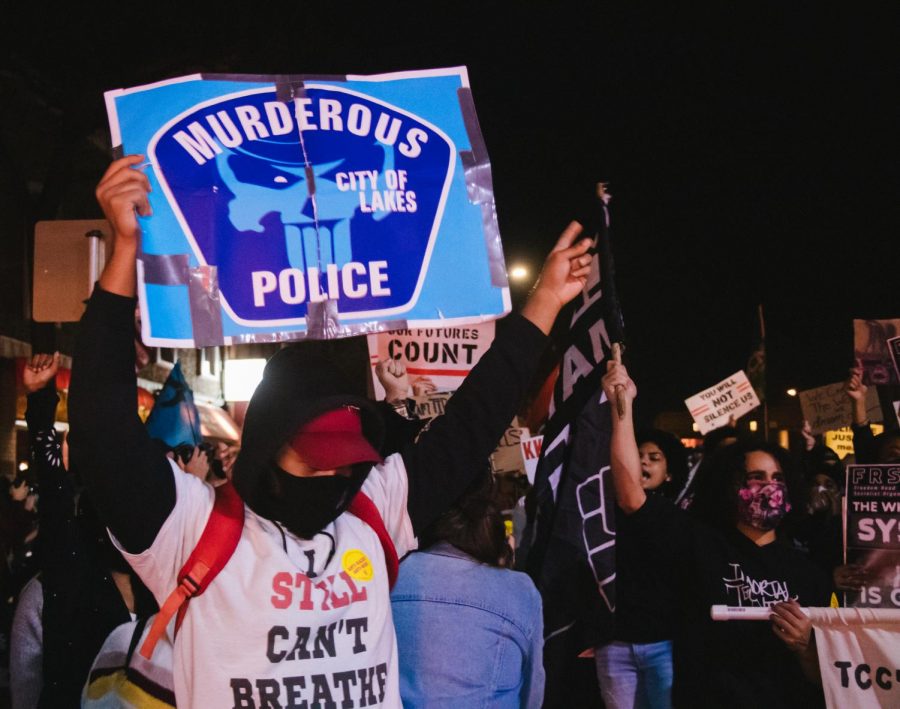
Audrey Rauth
Protesters march on Cedar Avenue South on Wednesday, Nov. 4. The rally was held to address a People’s Mandate requesting action be taken to end racism, COVID-19 and the recession no matter who wins this year’s presidential election.
Two charter amendment proposals for structural change in the Minneapolis Police Department are vying for the city ballot come November — one led by the Minneapolis City Council and one led by community members.
Both amendments are proposing that MPD no longer have a required minimum number of officers and that MPD be absorbed into a city department centered around public safety. However, despite council efforts to involve the community, the multi-organization group Yes4Minneapolis is pushing forward a proposal they said will more accurately reflect the people of Minneapolis’ agenda for police reform.
The two amendments differ from each other slightly, and both could end up on the city’s ballot come November.
Campaign manager for Yes4Minneapolis Corenia Smith said the two amendments are not in conflict, but that the community-led amendment will “contain language” that speaks better for the people of the city, and that the group will continue to work alongside city council members. The difference seems to lie in whether or not law enforcement is its own division within a new public safety department.
Amendments can be proposed to the charter in three ways: by the Charter Commission, the City Council or citizen petition. The citizen petition path requires signatures from at least 5% of Minneapolis residents who voted in the last election.
While Yes4Minneapolis doesn’t yet have the nearly 12,000 necessary signatures, the group is actively campaigning for them this weekend and in the coming months.
The City Council-led amendment
Ward 3 City Council member Steve Fletcher, alongside Council members Phillipe Cunningham of Ward 4 and Jeremy Schroeder of Ward 11, introduced the amendment to the City Council Jan. 29.
“[The amendment] is a way for people to move in the direction of creating some structural change … that changes oversight, and that changes transparency for how we do public safety,” Fletcher said.
The “Transforming Public Safety Charter Amendment” would establish a “division of law enforcement” within a proposed Department of Public Safety “made up of sworn peace officers responsible for the core functions of law enforcement,” according to a press release from the city.
“[The Department of Public Safety] would have a variety of approaches to public safety so that might be where an Office of Violence Prevention would go, or some of the other non-police public safety work that we do in the city,” Fletcher said.
The amendment is a revision of a similar charter amendment that was introduced — and eventually blocked by the Charter Commission — last summer after then-Minneapolis police officer Derek Chauvin killed George Floyd.
Cunningham said the new amendment was informed by more community input than last summer. He emphasized that the city will maintain “traditional law enforcement.”
“What we’re doing here is not some radical utopia. It’s a governmental restructuring in order to be able to meet the demands of our city of this present moment and the future,” Cunningham said. “We need to integrate various approaches to public safety, which includes but also goes beyond policing.”
The community-led amendment
Yes4Minneapolis — a coalition that includes Black Visions Collective and Reclaim the Block, who helped draft the city-led amendment — is introducing its own amendment on behalf of community members.
Instead of a subdivision for law enforcement under a Department of Public Safety, this amendment aims to create “a single department that employs employees of multiple skill sets including law enforcement,” Smith said in an email to the Minnesota Daily.
In order to push that change of language, Yes4Minneapolis is launching its own grassroots effort this coming weekend.
“There was a lot of pushback this summer about the process that was led by the Council not including enough community voice in the formation,” said Sheila Nezhad, a policy organizer for Reclaim the Block and Minneapolis mayoral candidate.
Smith said because the council is limited by a tighter timeline for charter amendments, she hopes city officials will support the community-driven process and the work that comes out of it. Smith also said that the two amendments are not in conflict, and the group plans to continue collaboration with the City Council.
Nezhad said that it is ideal that there only be one of the two proposed amendments on the ballot. The group hopes it will be the citizen petition, as it does more than just consult with the community.
“What that really does is make sure that it’s the community leading to put this on the ballot,” Nezhad said. “It’s not just the City Council or the Charter Commission. It’s really for and by the people.”
